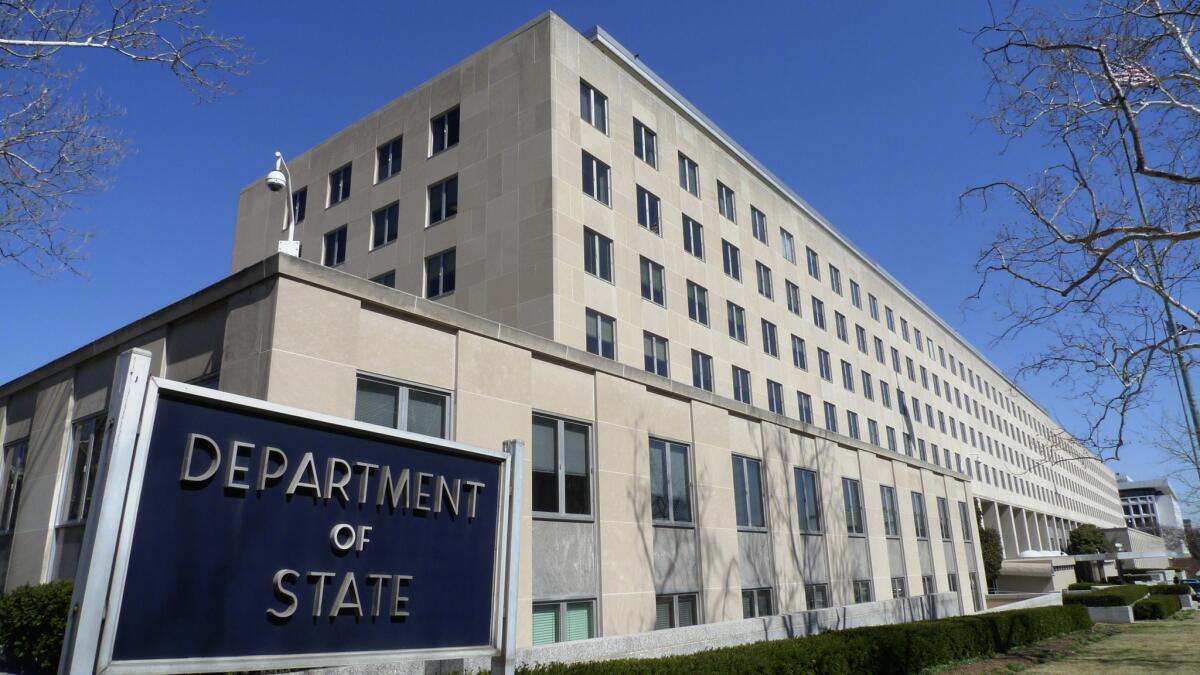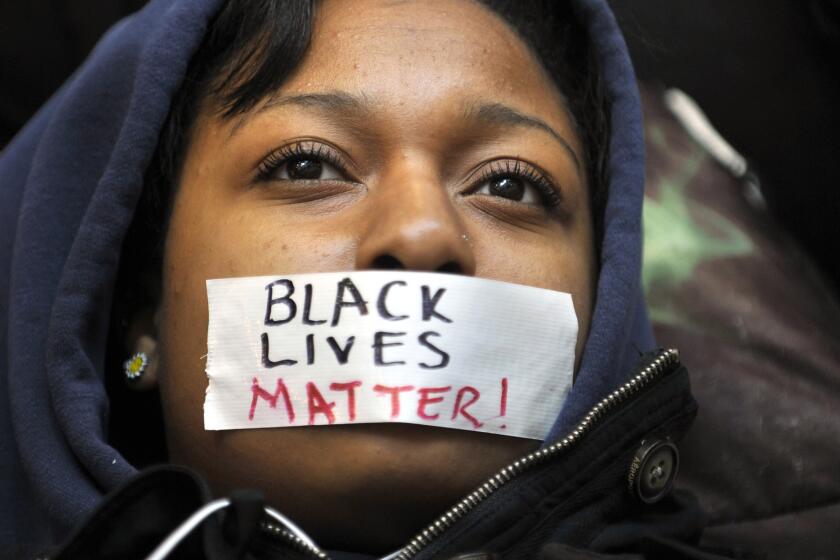If it weren’t for the color of my skin, I’d still be a U.S. diplomat

- Share via
My first day working on the consular line at the U.S. State Department in Juarez, Mexico, I was subjected to a strange look followed by an unexpected question. I had just finished interviewing a visa applicant and was handing him back his paperwork when he asked: “Where are you from?”
“I’m from the United States,” I responded, earnestly explaining that all of the consular officers conducting interviews were American. Still seeming confused, he shrugged, thanked me and left.
I wondered who the visa applicant thought would interview him. In retrospect, after months of interviewing applicants, it occurred to me he might have been expecting a white person to greet him from behind the consulate counter in 2018 instead of me: a diplomat with black skin, an Afro and a nose ring.
For months, I worked as a consular officer for the U.S. State Department in Juarez. I started the job with a sincere desire to represent and serve my country. Each day I felt a sense of pride as I interviewed applicants for immigrant visas and interacted with colleagues and U.S. officials. This soon began to dim.
Another question I was often asked: “What is it like to be a Black U.S. diplomat abroad?” If I could answer honestly, I would have said it made me feel like I belonged neither here nor there. What I said was that I was proud to serve my country.
From my perspective, to be a Black diplomat abroad and work in a consulate or embassy is to be questioned persistently by applicants who often demand to speak to “an American.” The first time this happened, I had just rejected a visa request. The applicant angrily refused to leave, even though I calmly explained why his visa was being denied. When my manager, a white woman, intervened to explain my reasoning, the applicant was kind and understanding in response even though my manager and I had said the same thing. This happened to me all the time — a final decision that I had the authority to make often needed to be clarified to visa applicants by my managers.
In my experience, to be a Black diplomat is to be questioned not just by those abroad but also by the country you call home. When I would cross the Mexico-U.S. border into El Paso, Texas, U.S. Customs and Border Protection officials asked if I had stolen my car. They’d question whether my diplomatic passport was counterfeit. They accused me of being a drug dealer and a liar.
Since border crossing was such a nerve-wracking process, my colleagues would wait for my “all clear” text once I had safely entered the U.S., the country where I was born and which I served.
In an increasingly desperate attempt to shore up his base, Trump is attacking diversity training and a newspaper project about slavery.
When I told State Department officials about the harassment, I was met with a question: Was I sure it was racism? Yes, I was. It was unnerving. I didn’t understand why I was forced to continue explaining and advocating in ways that my white counterparts did not.
The solution was to transfer me away from the border to the U.S. Embassy in Mexico City. But the overwhelming stress I’d been experiencing didn’t go away. A State Department medical official diagnosed me with post-traumatic stress disorder, major depressive disorder and generalized anxiety disorder. I was 26.
The State Department soon terminated my employment, and I returned last fall to the U.S. — a country that may finally be coming to terms with its history of white supremacy and systemic racism. A country that oppressed my ancestors and so many others and that continues to marginalize Black and brown communities. Welcome home?
After a blog post I wrote in May about my treatment as a diplomat received attention, Customs and Border Protection in Washington released a statement saying an internal investigation “found no evidence of misconduct.” The State Department said it took my allegations “very seriously” and was working to “increase the diversity of our workforce and foster a more inclusive organization.”
I sincerely hope that is true, but I have my doubts. The State Department needs to reimagine what diversity, inclusion and equity mean, how to retain people like me, and reexamine a culture that the diplomatic community widely recognizes as pushing Black and brown diplomats away.
Back home in America, I’ve had plenty of time to reflect on my time as a diplomat or, more precisely, a Black diplomat in a system that I believe is designed to fail me. Since leaving the State Department, I learned how few people who look like me have served it. The percentage of African Americans in the foreign service increased by only one percentage point, to 7%, between 2002 and 2018, according to a recent report by the Government Accountability Office.
Even when Black and brown U.S. citizens join the State Department, they are far less likely than their white counterparts to be promoted. Only 3% of Black Americans hold senior-level career jobs at the State Department, according to its own data, while we represent more than 13% of the U.S. population.
People of color carry a burden in the diplomatic corps as they explain over and over how their experience differs from that of their white-majority colleagues. But I never felt that anyone in power was listening to me or even cared. If it weren’t for the color of my skin, I would still be a diplomat.
Chigozie Okocha, a foreign service officer, recently described the racism Black and brown State Department employees endured as a “slow burning car” that onlookers stare at as they drive past before looking away.
That car travels a lonely road, one that did not make room for me.
Tianna Spears is a former diplomat at the State Department.
More to Read
A cure for the common opinion
Get thought-provoking perspectives with our weekly newsletter.
You may occasionally receive promotional content from the Los Angeles Times.










